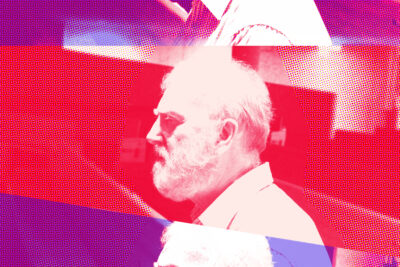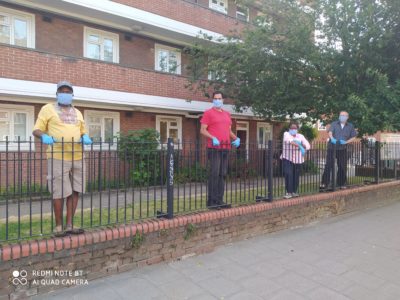Supporting those with HIV, in the age of COVID-19
Read this article in the limited edition print version: order a copy here.
A tiny virus has certainly upset society, again. Covid-19 is the latest symptom of a deeper crisis. In addition to the climate change emergency, the evils of racism have re-emerged in public consciousness. The turmoil of Brexit continues, and another little virus, HIV, which has never gone away, remains a crisis of global proportions.
Covid-19 is not so new. Structural injustices, the foundations and consequences of the present world-order, have been brought to attention before. What is new is that the negative effects of this crisis are being felt more commonly. This virus arrived smack-bang in the midst of our society, disrupted everyone’s lives, leaving no person untouched by it, in some way.
Paradoxically, God’s special presence – and summons to respond – is often revealed in crisis. But discerning it isn’t easy.
I am reminded of Enda McDonagh’s insight from 1994 that HIV & Aids marks “the time of God’s special presence and summons”. McDonagh drew upon the Greek concept of ‘Kairos time’ as used in scripture, when the truth of ‘God-with-us’ is revealed in new, surprising, and often upsetting ways. Kairos is also a moment of opportunity, from which greater good may come. Paradoxically God’s special presence and summons to respond is often revealed in crisis.
However, discerning God’s special presence, let alone our responses, is not easy. Especially in the midst of crisis, our fears and insecurities, the impulse to fly from sites of danger, tiredness and the magnitude of converging problems can leave us feeling not just vulnerable, but powerless and hopeless. To adapt an old saying: he who has not been tempted to hopelessness, has not understood the challenges or undergone the suffering. Whatever else can be said of Covid-19, that it is a sign of greater disruption to come is surely undisputable, except by the most naïve.
During another pandemic, Julian of Norwich wrote that we only know evil exists because of the suffering it causes. Never in my lifetime have so many distinct yet related signs of suffering appeared all at once to such effect. How to respond? Where to begin?
How can we carry the suffering of those worst-hit?
This crisis heightens awareness of those who live continually at sites of suffering. As always, the worst effects are manifested within marginalised communities. Covid-19 is not so new for them, but adds weight to pre-existing burdens. As we wait upon a fuller revelation of the Divine Word, where else can we begin but here, in solidarity with them? In imitation of Simon of Cyrene, how can we share in the cross that others bear continuously?
Many people with HIV (PLWH) live with additional health conditions or are elderly and have stayed isolated. For many, isolation triggers that deep wound of exile experienced by migrants who have been separated from their families. For others, the threat of Covid-19 is a reminder of previous encounters with mortality and the trauma of so many deaths from Aids. Too many have yet to recover from the violence of racism, homophobia and patriarchy that made them vulnerable to HIV in the first place. So many endure the long grinding down of poverty and the structural erosion of dignity. Too many remain under the power of exclusion, judgment, rejection and blame, that has afflicted them ever since the day of their HIV diagnosis.
Christ is present among us, suffering, rejected and often mocked; comes to us weakened. He comes to us as one, sick and in need, a stranger: as one who suffers.
During this most recent crisis, CAPS’ ‘Positive Catholics’ community have continued to share the burden of the cross of HIV in various ways:
Mr Shah
Mr Shah has lived in his car since his family ostracised him after his release from prison. Since Covid-19, his delivery work has ceased. He is not entitled to any state support, and is suspicious of receiving help from most agencies for fear that the Home Office will use his destitution to deny his application to remain in the UK. CAPS’ volunteers check in with him regularly by phone; Lazarus and Abigail visit him at the car park, and bring him halal food.
Ahmed
Ahmed, a recently arrived 16 year-old Somalian, spent three years in a refugee camp. Bullet wounds testify to his trauma. He exists in ‘supported accommodation’, which means he lives alone. He received a late-HIV diagnosis in January. Ahmed displays ‘challenging’ behaviours and his mental health deteriorated severely. The social worker had not found an HIV agency able to cope with Ahmed’s complex needs and turned to CAPS for advice.
Ahmed is convinced that HIV is a judgment from God. Attempts to find an Imam were fruitless. We advised the social worker on how to engage Ahmed on the issue of HIV as divine retribution. We signposted our ‘Positive Faith’ Films as useful tools to facilitate conversation. We replaced Ahmed’s broken phone, sent with love from PLWH. Perhaps this gesture and listening to PLWH via ‘Positive Faith’ will give him hope that he is not alone. We remain available to support Ahmed in the future.
Mary
The community nurse called. She explained she was restricted from making house-calls, but was concerned for ‘Mary’ who had been uncontactable for weeks. Worry intensified since Mary failed to collect medications for HIV, diabetes and mental health, without which her health would deteriorate dangerously. Mary had spoken of attending our retreats. Was there anything we could do?
Abigail and Lazarus rang but got no reply. They arranged to pick up Mary’s medication and went to her home. They banged at the door persistently. We agreed that if Mary did not respond, the police must be called. Eventually, tentatively, she replied “who’s there?”.
Later, we received an appreciative letter from the nurse who has since spoken with Mary. Deeply moved, Mary’s isolation was relieved, perhaps her life was saved.

There are others, too: Thomas volunteered to shop for Bob who is fearful of venturing out; Tyrone supports a man with cancer undergoing palliative care. We encourage phone contact between members, thinking especially of the most vulnerable. ZOOM provides some alternative to group meetings.
In Manchester, Joyce and Adela listen to PLWH, some known, others new, and distribute small cash grants to relieve hardship. Similar conversations of care and solidarity happen via John and Tilly in Birmingham, Michael at Minsteracres, in London and Bristol. In these ways too, a Christian presence at the site of suffering of HIV is actualised. Of 79 small grants distributed since June, 50% recipients have no recourse to public funds; 80% is for food; 28% to those with children; 64% to Black African people.
With all that, perhaps God’s special presence and summons may not be so difficult to understand. As John Sherrington CP put it prophetically:
“Christ is present among us, suffering, rejected and often mocked; comes to us weakened. He comes to us as one, sick and in need, a stranger: as one who suffers! As a Passionist, I have been in ministry, to, with, and for, people who have the Human Immune Virus since the early 1990s, when times were very grim regarding the pandemic. I have had time to journey with them and reflect with them, on the issues. I find myself now understanding that, “the Name of Jesus is written on the forehead of people who are HIV+”. They bear the wounds of suffering, of stigma and often rejection. In Positive Catholics, I have seen them to be Simon of Cyrene to one another, and to others. I have seen, by their sickness (their Cross) they, like Christ have broken down in their bodies the walls of divisions; the division between male and female, black and white, well-off and poor, citizen and stranger, Gay and Heterosexual.” (World AIDS Day, 2011)
Related Stories

Inner State: Passionist Life in North Belfast
North Belfast is a community that has seen immense trauma over the past century – defined by political forces beyond its control.
May 30 2024

To Illumine the Mind: the Catholic diaspora in Paris
In Paris, Martin Coffey leads a church overflowing with working class immigrants. The picture of religion in France, he tells us, is not what you think.
Mar 01 2024

Positive Faith present a World Aids Day service, ‘The Reason for Hope’
Reflections, music and scripture as well as opportunities for sharing on this World Aids Day online service.
Dec 01 2023




